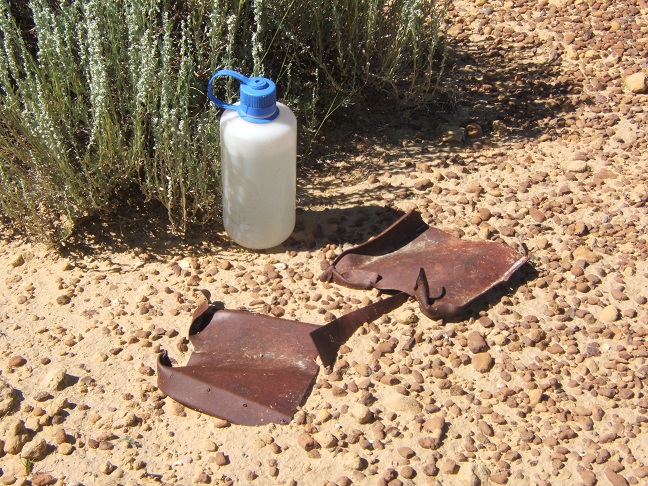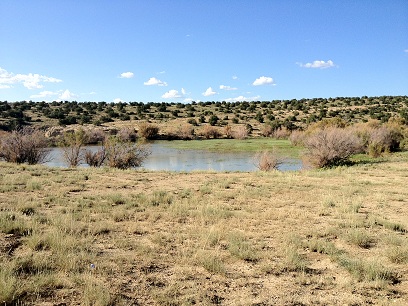|
Bob Cunnings NW8L
This year I returned to the Ojito Wilderness for FOBB. The location was
up on a mesa overlooking the Arroyo Bernalillito area of the Wilderness
northwest of Albuquerque, NM, adjacent to Zia Pueblo lands. A narrow
promontory juts out northward from the main body of the mesa, with its
head standing about 300 feet above the surrounding terrain at an elevation
of 6100 feet. This is a great spot for a QRP station if you don't mind
the July heat!
|
| 
|
|
|
| 
|
|
The caprock forms a sheer vertical sandstone wall at the top and the slopes
below are steep with ia lot of loose and crumbling rock. The best way up is
to climb the ridge at the far left and work up to the wall very gradually
over the slopes and terraces below. Then the wall can be followed to the
entrance point.
|
| 
|
|
A tree marks a break in the sandstone wall which is one of the few places
offering easy access to the top.
|
| 
|
|
Here a tree is perched precariously on a sandstone shelf supported by
crumbling mudstone.
|
| 
|
|
This year the antenna was a 33 foot doublet with a balanced feedline, made
from vinyl speaker wire. The antenna was supported by a 32 ft. telescoping
fiberglass windsock pole, tied to a juniper tree. It was set up as a
"sloper" with the low end tied off to another juniper tree. This was all I
needed since I was making a single-band effort on 20 meters. The rig is my
trusty Elecraft KX1, with a small self-powered speaker. Power is supplied
by 8 AA cells in an external pack. RF output is about 3W on 20 m.
|
| 
|
|
Near the edge the rock is broken up, and I set up the shack in this cleft
under the juniper tree holding up the antenna mast, with a "Noah's Tarp"
for shade.
|
| 
|
|
To the West is Cabezon, a volcanic plug, looming on the horizon.
|
| 
|
|
To the North is the area in the Ojito Wilderness where the dinosaur
"Seismosaurus" was excavated. The old track you see leads to the
excavation site.
|
| 
|
|
To the East is White Mesa, where gypsum is mined to make wallboard.
|
| 
|
|
Conditions were variable, with stations fading in and out the whole time.
I made 39 QSOs, all on 20 meters. 35 were with fellow BBs, and 4 with home
stations. 25 states and provinces were worked:
ID, CA, MI, WA, IL, OR, GA, MS, WI, WV, ON, NY, AZ, ND, IN, OH, MO,
NM, NE, TX, TN, NC, VA, OK and FL.
Once FOBB was done, I took a few pictures before heading down.
|
| 
|
| 
|
|
Even though this seems like a tough place to live, wildflowers manage to
grow here. It rained quite a bit in these parts in the last 2 weeks so
these flowers are blooming.
|
| 
|
|
The juniper trees are pretty gnarled, this one is showing how they help
break up the rock with their roots.
|
| 
|
| 
|
| 
|
|
Scattered around on top are old crumpled fragments of heavy iron sheet
metal. I've been told that this area was used as a bombing range for the
training of B-17 crews flying out of Kirkland Field during WWII, and
that these are dummy bomb fragments. I don't know if that is true. If not,
it's a mystery, because there seems to be a lot of the stuff out here.
|
| 
|
|
Here is a picture of a stock pond filled by recent rains, east of the Ojito
on the way out. I haven't seen this pond filled in years. The last time it
I saw it filled it was populated by "desert shrimp", strange crustaceans
that lurk deep in the ground during dry times, then emerge when the pond
fills. I didn't get close enough to look for them this time.
See you next year!
|
















